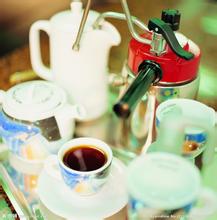El Salvador boutique coffee bean flavor and taste the characteristics of the manor producing area introduce the Santa Ana volcano area
Central American countries generally distinguish quality grades by altitude, such as Costa Rica, Guatemala, Mexico, Honduras and other countries. Similarly, El Salvador is graded by altitude. At high altitudes, due to the cold climate and slow coffee growth, the density of raw beans will be higher, the hardness will be stronger, the unique acidity of Arabica will be better, and of course the better the quality will be. Therefore, the higher the altitude of coffee growth, the better the flavor, on the contrary, the lower the altitude, the higher the temperature, the faster the growth rate, the lower density, the lower hardness and the worse quality of raw beans.
El Salvador's coffee accounts for 40% of the country's exports, and it is usually picked in November, December and January-March of the following year. The export of raw beans lasts almost all year round. Coffee is produced in seven of the country's 14 provinces, with the largest number in the northwestern provinces of chalatenango and santa ana. El Salvador produces 100% Arabica coffee, 68% of which is bourbon, which usually grows at an altitude of 1062 Mel 1972 meters. On the other hand, El Salvador has a unique mountain, river and plateau, which provides a suitable environment for the growth of bourbon coffee. At the same time, El Salvador's suitable temperature, abundant precipitation and fertile soil are also indispensable natural conditions for breeding high-quality coffee beans. Like other typical island beans, Salvadoran coffee has the same flavor characteristics as well-balanced, soft and fine coffee varieties.
The civil war caused chaos and affected economic development, but ironically allowed the ancient coffee to be preserved, and the situation was so chaotic that coffee producers in El Salvador failed to catch up with the renewal of coffee varieties in Central and South America.
El Salvador produces 100% Arabica coffee, of which 68% is Bourbon, Coffea arabica var. Bourbon), 29% Pacas, other varieties including Pacamara,Caturra, etc.
The Pacas variety, first discovered in El Salvador in 1949, is a natural hybrid between bourbon and Catura.
The variety Pacamara, which was artificially bred by pacas and maragogipe (or maragogype), was first bred in 1958 (1954). Pacamara species is a rare artificial breeding of excellent varieties, blue is better than blue, perfectly inheriting the advantages of the mother plant, both the excellent taste of pacas species, raw bean granules also inherited the large size of malagogipe. The Pacamara species is thought to be the result of the pursuit of large Arabica species.
Coffee planting
Most of them are planted by small farmers. Grading of farmers in El Salvador: (1 htct= 105mu = 10000 square meters)
Small farmers, small producer, area less than 7.0hect
Medium-sized peasant household, medium producer, area between 7. 0-70hect
Large farmers, large producer, the area is larger than 70hect.
Farmers use traditional planting methods, with almost 100% shade planting.
Coffee harvest
Pick by hand.
The harvest season lasts from October to March. The peak occurs from November to February.
Coffee treatment
Washing treatment, sun drying

Important Notice :
前街咖啡 FrontStreet Coffee has moved to new addredd:
FrontStreet Coffee Address: 315,Donghua East Road,GuangZhou
Tel:020 38364473
- Prev

Elegant Panamanian Coffee Bean Flavor Taste the characteristics of the manor production area
When the commodity price of coffee was relatively low, the Panamanian Fine Coffee Association organized a competition called Best Panama: coffee beans from different parts of Panama were ranked and auctioned online. Esmeralda Manor has been growing a kind of coffee called Geisha for many years, and the auction has made their coffee known to more people. After that
- Next

Nicaraguan Coffee Flavor Manor in Central America introduction to boutique coffee beans
Why do instant coffee easily lead to infertility? According to the editor of the China Food and Beverage Network, both instant coffee and milk tea contain large amounts of milk trans fatty acids. According to relevant experts, these trans fatty acids reduce male hormone secretion and inhibit sperm motility; they also affect egg quality and increase the risk of infertility and fetal malformations. Trans fatty acids affect
Related
- Detailed explanation of Jadeite planting Land in Panamanian Jadeite Manor introduction to the grading system of Jadeite competitive bidding, Red bid, Green bid and Rose Summer
- Story of Coffee planting in Brenka region of Costa Rica Stonehenge Manor anaerobic heavy honey treatment of flavor mouth
- What's on the barrel of Blue Mountain Coffee beans?
- Can American coffee also pull flowers? How to use hot American style to pull out a good-looking pattern?
- Can you make a cold extract with coffee beans? What is the right proportion for cold-extracted coffee formula?
- Indonesian PWN Gold Mandrine Coffee Origin Features Flavor How to Chong? Mandolin coffee is American.
- A brief introduction to the flavor characteristics of Brazilian yellow bourbon coffee beans
- What is the effect of different water quality on the flavor of cold-extracted coffee? What kind of water is best for brewing coffee?
- Why do you think of Rose Summer whenever you mention Panamanian coffee?
- Introduction to the characteristics of authentic blue mountain coffee bean producing areas? What is the CIB Coffee Authority in Jamaica?

